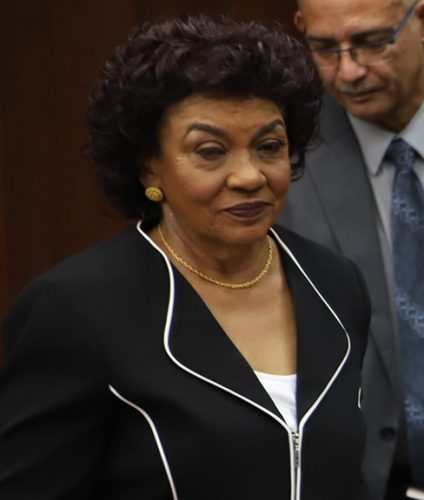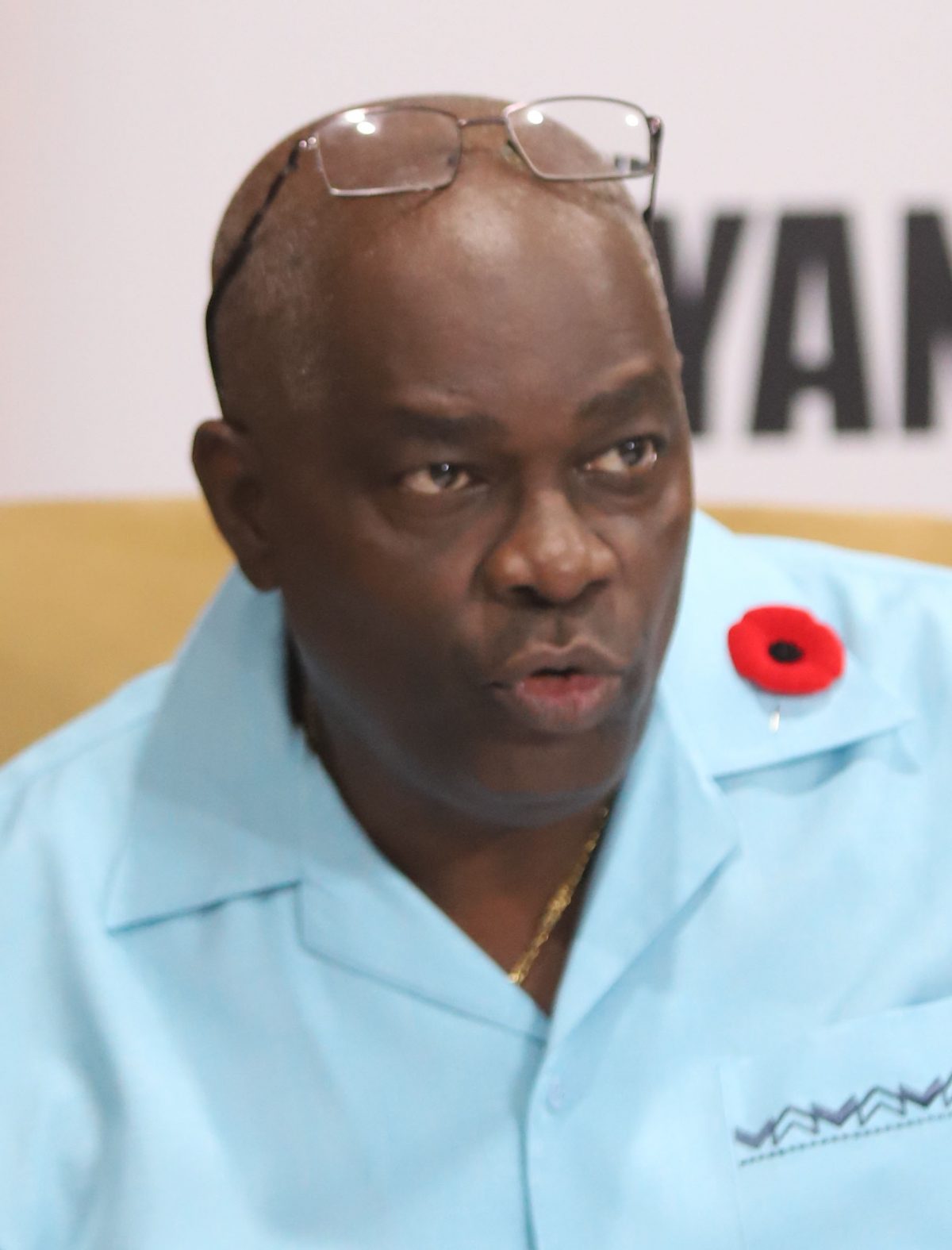The lawyers for Misenga Jones have formally asked the Court of Appeal to set aside the decision of acting Chief Justice Roxane George-Wiltshire upholding the validity of the national recount of votes from the March 2 polls.
In keeping with a commitment made after the Chief Justice’s ruling on Monday, counsel for Jones yesterday filed an appeal that contends that the Justice George-Wiltshire erred in law in her pronouncements on the recount, the results of which she said is the only data that could be used by the Guyana Elections Commission (GECOM) to declare a winner of the elections in keeping with a judgment by the Caribbean Court of Justice (CCJ).
Through her attorney, Mayo Robertson, Jones contends that the judge erred in law when she failed to find that the Chairperson of GECOM Justice (ret’d) Claudette Singh and the Commission itself had acted outside their constitutional and or statutory powers.

Jones is of the view that Justice George-Wiltshire erred in her holding that the declarations of the Returning Officers (ROs) on March 13, which were made pursuant to Section 84 of the Representation of the People Act (RPA), had been overtaken by events, were no longer useful, and, therefore, could not be resurrected.
Jones’ application before the High Court has been based on her contention that the Chairperson could only make a declaration from the report submitted by Chief Election Officer (CEO) Keith Lowenfield based on the reports he received from the ROs of each of the 10 electoral districts as opposed to the results of the recount.
The Chief Justice, however, dispelled this view as she noted that based on the interpretation of the CCJ’s decision regarding Order 60, by which the recount was facilitated, the declarations of the ROs could not be used.
Among other things, the Chief Justice ruled that GECOM, “in its wisdom,” considered that there were difficulties that had to be addressed in order to produce what is termed in Order 60 as a credible count.
Quoting from the judgment of the Guyana Court of Appeal in the Ulita Moore case—a previous challenge mounted in these elections by an APNU+AFC candidate—Justice George-Wiltshire noted where that court said that it was “within GECOM’s functions to resolve those controversies as part of its responsibilities to deliver results of the elections.”
Jones argues that Justice George-Wiltshire erred in law by validating Order 60, failing to properly construe its terms and provisions and also ruling that this issue was res judicata (a thing, matter, or determination that is adjudged or final).
In dismissing Jones’ challenge to Chairperson Singh using the national recount to finalise the results, the Chief Justice specifically underscored that all the grounds of her application had already been litigated during previous challenges to these very elections and that their re-litigation was a waste of the court’s time.
In her appeal, Jones contends that the judge erred by failing to determine that Order 60 was materially and substantially inconsistent with the RPA and could not constitute a new legal regime.
Jones is also contending that the Chief Justice erred when she held that the issue of the constitutionality of Section 22 of the Election Laws (Amendment) Act (ELA) was res judicata.
Jones had argued in her application that this section, under which GECOM issued the recount order, was unconstitutional.
However, the Chief Justice underscored that this subject matter had already engaged the court’s attention and emphatically decided upon in the Moore case, where the Court of Appeal “clearly” held that the legality of Section 22 was “a matter to be frontally examined by the court at a full hearing,” that being in an elections petition.
Against this background the judge said that the Court of Appeal having pronounced that a challenge to the constitutionality of Section 22 would be for such a petition, the principles of res judicata applied.
Errors
Jones’ appeal also advances that errors were made by the judge in the interpretation of Section 18 of the ELA, section 96 of the RPA and Article 177 of the Constitution.
The now appellant had contended before the High Court that the Chairperson was obligated to make declarations only from the report submitted by the CEO and no one else or by no means other than those submitted to the CEO by the ROs of the respective electoral districts.
But the judge said that the declarations of the ROs can no longer be considered useful; even as she added that while the CEO may be expected to act independently, he cannot be a “lone ranger.”
The judge said she agreed with the submission made by opposing counsel that Article 177(2) (b) of the Constitution can be construed to mean that GECOM is not to act on the advice of any person or body external to the Commission.
Justice George-Wiltshire then went on to state that she did not agree with arguments advanced on behalf of the applicant that the CEO has a constitutional mandate under Article 177. Instead, she said it is the Chairperson and GECOM that have the constitutional mandate.
“The CEO is a functionary of GECOM pursuant to Article 161(A) and subsections 2 and 7 of the Representation of the People Act (RPA),” Justice George-Wiltshire said, while adding that Section 18, which is repeated in Order 60, merely confirms this “and the obvious for the avoidance of doubt—that the CEO cannot act on his own. In this regard, he has certain duties as regards tabulating results as provided for in Section 96 of the RPA.”
The judge noted that contrary to Jones’ position, Section 18 is not unconstitutional, and is not in conflict or in tension with Article 177.
A date is likely to be set shortly by the appellate court for case management and the hearing of the appeal.
The Commission, Singh, Lowenfield, the Attorney General, the main opposition People’s Progressive Party/Civic (PPP/C) and the other non-government political parties which contested the March 2nd elections are listed as respondents in Jones’ action.
Jones had contended that Singh could only make a declaration from the report submitted by Lowenfield and that neither she nor the Commission could dictate to him what his report should contain.
As a result, Jones asserted that GECOM was obligated to accept the CEO’s report of June 11th, in which he relied on the declarations made up to March 13 by the Returning Officers for the 10 administrative regions.
Those declarations, which were disputed due to the manipulation of the Region Four results, had been held in abeyance as the recount was agreed to. The recount showed that the PPP/C won the majority of votes, while Lowenfield had sought to declare results in favour of the incumbent APNU+AFC.
Jones was asking the court to make a number of declarations, including that Singh had failed to act in accordance with the advice of the CEO in his most recent report as mandated by Article 177(2) (b) of the Constitution.
Following the CCJ ruling, Singh had instructed Lowenfield to submit a report using tabulations from the national recount of ballots cast on March 2nd. Lowenfield has, however, repeatedly submitted reports which show a win for the incumbent.





